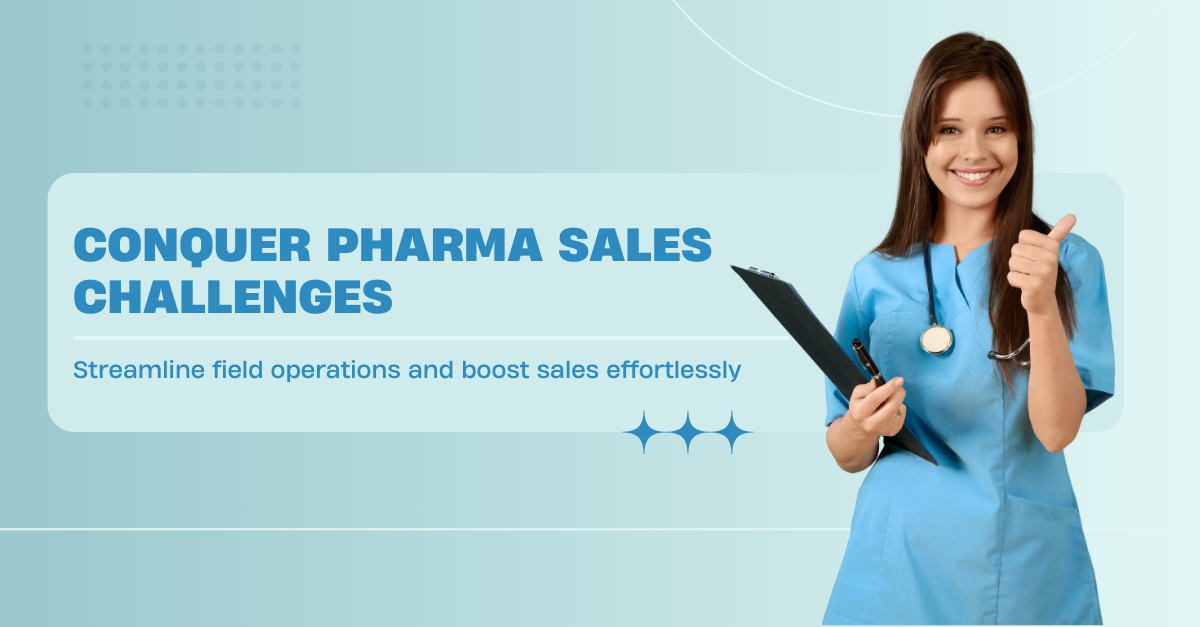Top Challenges in Pharma Field Sales and How to Solve Them

Pharma field sales has always been a demanding job, but today’s medical representatives (MRs) are dealing with more pressure than ever. Doctors have busier schedules. Competition has multiplied. Information overload has turned simple tasks into time-consuming routines. And yet, pharma companies still expect their field teams to deliver consistent results, build strong relationships, and meet strict compliance requirements.
In many ways, the role of a medical rep has become similar to that of a courier trying to navigate a crowded city without a digital map. You may eventually reach the destination, but you’ll waste unnecessary time, energy, and effort along the way. That’s why modern companies are shifting toward smarter pharma field force management.
In this article, we’ll focus specifically on the top challenges in pharma field sales and the practical ways to solve them using modern tools, better planning, and simple, real-world strategies.
Challenge 1: Time-Consuming Schedule Planning
Scheduling is a significant challenge for pharma sales managers. Coordinating multiple territories, rep availability, leaves, urgent meetings, and travel plans without automation is time-consuming and prone to errors. A poorly planned schedule can result in missed visits to high-priority doctors, inefficient travel routes, and unbalanced workloads across the field team. This reduces productivity and increases stress for both managers and reps.
Solution:
-
Smart Beat Planning: Plan weekly and monthly doctor visits using a structured, priority-based framework. Ensure high-value doctors are visited regularly while maintaining balanced coverage across the entire territory.
-
Optimized Travel Routes: Minimize travel time and boost productivity by creating intelligently mapped routes that connect multiple doctors in the same area. This reduces unnecessary detours and helps reps complete more visits efficiently.
-
Dynamic Adjustments: Easily adapt schedules to last-minute changes such as urgent doctor requests, cancellations, or shifting territory needs. Update plans instantly without affecting overall coverage or sales performance.
Implementing structured scheduling ensures reps focus on high-value interactions, balances workload evenly across the team, and minimizes wasted effort. Over time, this improves field efficiency and contributes to higher prescription conversions.
Challenge 2: Tracking Mileage and Travel Costs
MRs often cover urban, suburban, and rural territories in a single day. Manual mileage tracking is prone to errors and often results in inaccurate reimbursements, inefficiencies, and misallocated resources. Over time, these inefficiencies can inflate operational costs and reduce overall team productivity. Moreover, unnecessary or poorly planned travel increases fatigue, reducing the number of visits a rep can accomplish in a day.
Solution:
-
GPS-Enabled Travel Tracking: GPS Tracking automatically log distances traveled, routes taken, and time spent on the road.
-
Route Optimization: Find the most efficient and time-saving travel paths with intelligent route suggestions that reduce overall commute time, lower fuel expenses, and help field reps cover more visits in a single day.
-
Transparent Reimbursements: Maintain accurate digital travel logs that eliminate disputes and manual errors, ensuring smooth, transparent, and timely reimbursement processing with reliable records for audits and documentation.
Digital tracking enhances visibility, accountability, and resource efficiency. Managers can monitor field activity in real time, make data-driven decisions, and optimize schedules for better performance. Reps can focus more on doctor engagement rather than manual reporting of travel.
Challenge 3: Assigning the Right MR to the Right Meeting
Not all reps are equally suited to meet all doctors or present all products. Randomly assigning meetings may result in ineffective interactions, wasted time, and missed sales opportunities. Managers often rely on intuition or historical performance data that may not reflect the current situation, leading to mismatched assignments. Reps may end up handling complex therapies they are not confident about, while others capable of high-value interactions may be underutilized.
Solution:
-
Rep Performance Dashboards: Get a clear view of each rep’s strengths with detailed dashboards showing expertise, past achievements, product knowledge, and relationship history, helping managers align tasks with rep capabilities.
-
Strategic Assignment: Assign the right reps to the right doctors by matching their strengths, experience, and communication style, ensuring higher engagement, stronger relationships, and more effective field interactions.
-
Continuous Monitoring: Continuously track rep performance and workload to reassign tasks or territories instantly, ensuring balanced distribution, improved coverage, and efficient utilization of every rep’s potential.
Strategic allocation of reps ensures higher-quality interactions, stronger doctor relationships, and better prescription conversions. Aligning rep skills with product and doctor needs is a key principle of modern Pharma Field Force Management.
Challenge 4: Administrative Tasks Overload
Reps spend significant time managing paperwork, updating visit logs, distributing samples, and recording expenses. Manual reporting is time-consuming, error-prone, and reduces the time available for doctor engagement. Reps may also experience fatigue, leading to incomplete documentation or missed updates. Over time, this administrative burden can hinder sales performance, reduce productivity, and increase frustration across the field team.
Solution:
-
Automated Daily Reports (DCRs): Automatically generate daily call reports from real-time field activity logs, eliminating manual data entry, reducing errors, and ensuring accurate documentation of every visit and task completed.
-
One-Tap Check-Ins: Enable reps to mark attendance and complete doctor visit check-ins with a single tap, ensuring accurate time-stamping, location verification, and seamless tracking of daily field activities.
-
Digital Expense and Sample Management: Allow reps to submit travel expenses, upload bills, and record sample distribution digitally, ensuring transparency, faster approvals, and complete visibility into resource usage.
Automation reduces fatigue, improves accuracy, and frees up time for reps to focus on high-value activities like doctor engagement and relationship-building. Managers also gain immediate access to reliable data for better planning and decision-making.
Challenge 5: Unstructured Communication Between Reps and Managers
Pharma teams often use multiple communication platforms like WhatsApp, email, and phone calls. This fragmentation can lead to missed messages, delayed instructions, and inconsistent updates. Important updates may be overlooked, and task completion becomes harder to track. Fragmented communication reduces overall efficiency and increases the risk of errors in field operations.
Solution:
-
Centralized Messaging Platform: Unify all internal communication in one secure platform, ensuring every message, update, and instruction is clearly documented, easy to access, and fully accountable across the entire field team.
-
Task Assignment & Tracking: Assign follow-ups, product promotions, visit reminders, and territory tasks directly through the system, while tracking progress in real time to ensure timely completion and improved team coordination.
-
Real-Time Notifications: Send instant alerts and updates so reps receive critical instructions immediately, helping them respond faster, stay aligned with changing priorities, and maintain seamless on-ground execution.
Centralized communication reduces miscommunication, increases coordination, and improves operational efficiency. Field teams can focus on executing tasks accurately, and managers can monitor progress without relying on multiple scattered channels.
Challenge 6: Rising Overhead Costs
Without proper visibility into field operations, companies often incur high travel, overtime, and administrative costs. Mismanagement of resources, unoptimized routes, and redundant efforts contribute to overheads. Over time, these costs reduce the profitability of pharma field sales operations and can hinder business growth.
Solution:
-
Field Activity Monitoring: Monitor every rep’s real-time location, working hours, and visit completion digitally, ensuring transparency, better accountability, and a clear understanding of daily field performance.
-
Expense Management: Track all operational costs with real-time digital expense entries, helping managers maintain transparency, prevent overspending, and streamline reimbursement and approval workflows effortlessly.
-
Resource Optimization: Efficiently allocate tasks, balance territory workloads, and reduce unnecessary travel or repetitive efforts by analyzing real-time data, ensuring maximum productivity from every field resource.
Improved visibility and resource control help manage overheads effectively. Companies can allocate budgets wisely, monitor performance, and achieve better ROI on field operations.
Challenge 7: Continuous Training and Knowledge Gaps
Pharma products, therapies, and regulations evolve rapidly. Reps without continuous training may lack confidence, struggle to explain products effectively, or fail to answer doctor questions. Knowledge gaps can reduce credibility, weaken relationships, and lower overall sales performance.
Solution:
-
In-App Learning Modules: Provide reps with quick microlearning lessons on new products, therapy areas, and regulatory updates, ensuring they stay informed and continuously improve knowledge while on the field.
-
Performance Monitoring: Track each rep’s training progress, quiz results, and content completion to identify knowledge gaps early, helping managers plan targeted coaching and improve overall team competency.
-
Flexible Training Options: Offer virtual, on-demand, and remote training modules that reps can access anytime, allowing continuous learning without disrupting field schedules or day-to-day activities.
Regular training ensures reps remain confident, knowledgeable, and effective. Well-informed reps build stronger doctor relationships, improve engagement, and achieve higher prescription rates.
Challenge 8: Poor Visibility Into Field Activities
Managers often struggle to know which doctors have been visited, the duration of visits, or completion of assigned tasks. Limited visibility reduces accountability, makes performance tracking difficult, and delays strategic decision-making.
Solution:
-
Real-Time GPS Tracking: Monitor rep locations, visit check-ins, and task completion instantly with real-time GPS tracking that ensures accountability, transparency, and complete visibility of field movements.
-
Automated Activity Logs: Digitally record every doctor visit, sample distribution, order placed, and interaction, eliminating manual reporting and ensuring accurate, real-time documentation of all field activities.
-
Analytical Dashboards: Access powerful dashboards that reveal productivity trends, territory coverage gaps, rep performance insights, and improvement areas, helping managers make faster, data-driven decisions.
Improved visibility enhances accountability, allows timely interventions, and ensures optimal field operations. Managers can plan better and identify under-served areas efficiently.
Challenge 9: Manual Reporting Bottlenecks
Manual reporting reduces time for doctor engagement, increases the chance of errors, and delays access to actionable insights. Managers rely on outdated information, slowing decisions and reducing the effectiveness of field operations.
Solution:
-
Automated Reporting: Generate automated reports & analytics directly from logged field activities to gain real-time insights and improve decision-making.
-
Voice-to-Text Logging: Allow reps to convert spoken updates into digital logs instantly, simplifying documentation on the move, reducing manual entry, and ensuring accurate, real-time recording of field activities.
-
Live Dashboards: Provide managers with real-time analytics on rep performance, territory coverage, and activity completion, enabling quick decisions, better supervision, and proactive field management.
Automation ensures data accuracy, saves time, and allows reps to focus on core sales activities. Managers gain a clear, up-to-date view of performance without delays.
Challenge 10: Weak Follow-Ups and Relationship Management
Consistent follow-ups are crucial for strong customer relationship management and ensuring prescription conversions. Missed or delayed follow-ups can weaken trust and reduce doctor engagement, impacting overall sales performance.
Solution:
-
Automated CRM Reminders: Automatically schedule follow-ups, meetings, and tasks in the CRM to ensure no doctor or client is missed, helping reps maintain consistent engagement without manual tracking.
-
Detailed Visit Histories: Maintain comprehensive records of all past interactions, orders, and communications with each doctor, enabling continuity, personalized engagement, and informed decision-making for reps.
-
Recurring Visit Planning: Plan and automate recurring visits to key doctors to ensure consistent engagement and relationship management, even with rep changes or turnover, maintaining uninterrupted field coverage.
Structured follow-up strategies strengthen relationships, improve engagement, and enhance prescription conversion rates over time.
How Does Delta Sales App Help to Resolve the Pharma Sales Team’s Challenges?
Delta Sales App is a comprehensive solution designed to address the challenges discussed above. Here’s how it helps:
-
Smart Schedule Templates: Automatically create and optimize daily, weekly, and monthly schedules for all reps using priority and territory-based frameworks. Ensure maximum doctor coverage, avoid scheduling conflicts, and enhance field productivity effortlessly.
-
Real-Time Pharma Sales Tracking: Track field reps’ real-time locations, visit completions, and ongoing tasks. Gain instant visibility into daily activities, monitor performance, provide timely support, and ensure that all high-priority doctors are engaged consistently.
-
Task Assignment & Ad-Hoc Allocation: Quickly assign urgent or last-minute tasks to reps who are nearest to the location. Reduce travel time, boost efficiency, and ensure critical tasks like follow-ups, promotions, or sample deliveries are completed without delay.
-
Centralized Communication: Consolidate all messages, updates, attachments, and instructions into one platform. Eliminate miscommunication, ensure clarity and accountability, and keep every rep and manager on the same page across the field force.
-
Automated Reporting & DCRs: Generate daily call reports, order logs, sample distribution records, and other essential field data automatically. Reduce manual work, minimize errors, and provide management with accurate, up-to-date insights effortlessly.
-
Performance Dashboards: Analyze Medical Representative Performance, rep productivity, territory coverage, call frequency, and target achievement through intuitive dashboards. Make data-driven decisions, identify gaps, and optimize field strategies to maximize sales outcomes efficiently.
-
Compliance Management: Record every doctor visit, sample distribution, and interaction digitally to ensure full transparency. Simplify audits, maintain regulatory compliance, and provide accurate, verifiable documentation for every field activity.
By using Delta Sales App, pharma companies can empower their field teams to focus on what matters most - building relationships, increasing prescriptions, and driving growth.
Final Thoughts
Pharma field sales tracking is fast-paced, demanding, and fiercely competitive. Reps constantly juggle scheduling, compliance, sample management, reporting, and building strong doctor relationships - all while striving to hit ambitious targets. Implementing a structured Pharma Field Force Management strategy streamlines these operations, reduces administrative burdens, and boosts overall rep productivity.
With tools like Delta Sales App, teams gain real-time tracking, automated reporting, and optimized scheduling, allowing reps to focus on meaningful, high-value doctor interactions. By combining smart technology with effective field management practices, pharma companies can strengthen doctor engagement, maintain compliance, consistently achieve targets, and drive sustainable growth in an increasingly competitive market.









